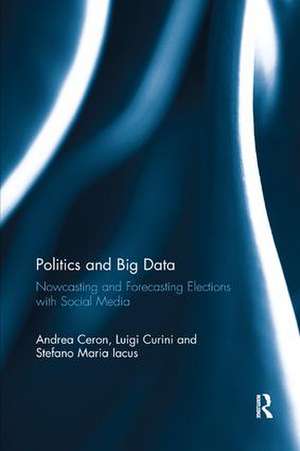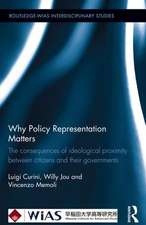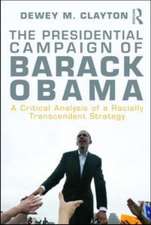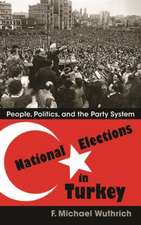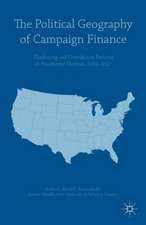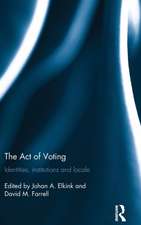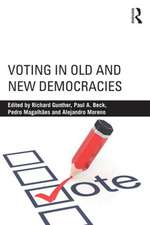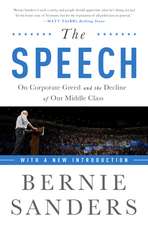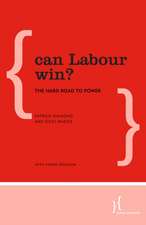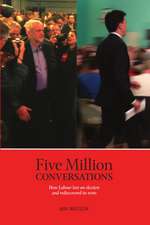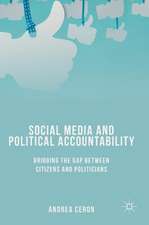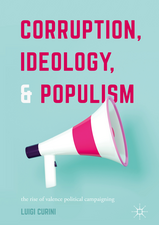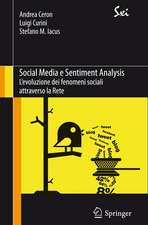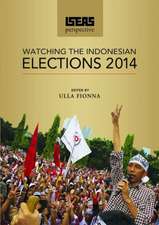Politics and Big Data: Nowcasting and Forecasting Elections with Social Media
Autor Andrea Ceron, Luigi Curini, Stefano Maria Iacusen Limba Engleză Paperback – 8 ian 2019
| Toate formatele și edițiile | Preț | Express |
|---|---|---|
| Paperback (1) | 349.80 lei 6-8 săpt. | |
| Taylor & Francis – 8 ian 2019 | 349.80 lei 6-8 săpt. | |
| Hardback (1) | 1107.61 lei 6-8 săpt. | |
| Taylor & Francis – 9 ian 2017 | 1107.61 lei 6-8 săpt. |
Preț: 349.80 lei
Nou
Puncte Express: 525
Preț estimativ în valută:
66.93€ • 69.75$ • 55.42£
66.93€ • 69.75$ • 55.42£
Carte tipărită la comandă
Livrare economică 03-17 aprilie
Preluare comenzi: 021 569.72.76
Specificații
ISBN-13: 9780367194550
ISBN-10: 0367194554
Pagini: 188
Ilustrații: 62
Dimensiuni: 156 x 234 x 10 mm
Greutate: 0.45 kg
Ediția:1
Editura: Taylor & Francis
Colecția Routledge
Locul publicării:Oxford, United Kingdom
ISBN-10: 0367194554
Pagini: 188
Ilustrații: 62
Dimensiuni: 156 x 234 x 10 mm
Greutate: 0.45 kg
Ediția:1
Editura: Taylor & Francis
Colecția Routledge
Locul publicării:Oxford, United Kingdom
Cuprins
Introduction
Chapter 1 Social media electoral forecasts: An overview
Chapter 2 From noise to signal in sentiment and opinion analysis
Chapter 3 Nowcasting and forecasting the campaign: Evidence from France, the United States, and Italy
Chapter 4 Leaders, promises and negative campaigning. Digging into an electoral campaign through social media
Chapter 5 Social media and electoral forecasts: Sources of bias and meta-analysis
Chapter 6 Conclusion. "To predict or not to predict?" Future avenues of social media research within and beyond electoral forecasts
Chapter 2 From noise to signal in sentiment and opinion analysis
Chapter 3 Nowcasting and forecasting the campaign: Evidence from France, the United States, and Italy
Chapter 4 Leaders, promises and negative campaigning. Digging into an electoral campaign through social media
Chapter 5 Social media and electoral forecasts: Sources of bias and meta-analysis
Chapter 6 Conclusion. "To predict or not to predict?" Future avenues of social media research within and beyond electoral forecasts
Notă biografică
Andrea Ceron is Assistant Professor at Università degli Studi di Milano, Italy, where he teaches Political and Administrative Systems, and Applied Multivariate Analysis for Social Scientists. His research focuses on intra-party politics, quantitative text analysis, media bias, and social media analysis. He has published a dozen of papers in international academic peer-reviewed journals like British Journal of Political Science, European Journal of Political Research, Party Politics, New Media & Society, Electoral Studies, Social Science Computer Review, Journal of Language and Politics, and others.
Luigi Curini is Associate Professor of political science at Università degli studi di Milano, Italy, where he teaches Political Science, Applied Multivariate Analysis for Social Scientists, Game Theory, and Analysis of Political Institutions. His research focuses on party competition, spatial theory of voting, and social media analysis. He has published over 30 papers in international academic peer-reviewed journals like Comparative Political Studies, Journal of Politics, British Journal of Political Science, European Journal of Political Research, Public Choice, Party Politics, European Political Science Review and many others.
Stefano Maria Iacus is Professor of mathematical statistics and probability at Università degli Studi di Milano, Italy. Member of the R Core Team for the deveolpment of the R statistical software. His fields of interest include computational statistics, theoretical statistics, inference for stochastic processes, text mining and sentiment analysis, and causal inference. He has published over 50 papers in international academic peer-reviewed journals.
Luigi Curini is Associate Professor of political science at Università degli studi di Milano, Italy, where he teaches Political Science, Applied Multivariate Analysis for Social Scientists, Game Theory, and Analysis of Political Institutions. His research focuses on party competition, spatial theory of voting, and social media analysis. He has published over 30 papers in international academic peer-reviewed journals like Comparative Political Studies, Journal of Politics, British Journal of Political Science, European Journal of Political Research, Public Choice, Party Politics, European Political Science Review and many others.
Stefano Maria Iacus is Professor of mathematical statistics and probability at Università degli Studi di Milano, Italy. Member of the R Core Team for the deveolpment of the R statistical software. His fields of interest include computational statistics, theoretical statistics, inference for stochastic processes, text mining and sentiment analysis, and causal inference. He has published over 50 papers in international academic peer-reviewed journals.
Recenzii
"Finally a book on Big Data and Social Media that provides a road map to sentiment analysis and is also theoretically interesting. Ceron, Curini and Iacus’ extremely fast algorithm can be used not only for forecasting and nowcasting elections but, as important, to conduct basic research on electoral political behavior. This is speed that we can do research with!" - Ernesto Calvo, Professor and Associate Chair, University of Maryland, Government and Politics
"Election studies have experienced three modern, more or less generational, scientific waves: voting behavior (from 1960), election forecasting (from 1980) and big data (from 2010). The book at hand, a pioneer effort, combines the last two waves, aiming to predict election outcomes in advance by utilizing the vast amount of data available via social media. While the task has much complexity, the distillations of these authors, systematic and clear, show considerable progress. They compare the performance of their Sentiment Analysis technique to more traditional methods of forecasting, mainly public opinion polls, and show how accuracy can be achieved. Their discussion of recent elections in France, Italy and the United States are especially provocative. This path-breaking text has be a "must-read" for any student of the election forecasting art." - Michael S. Lewis-Beck, F.Wendell Miller Distinguished Professor of Political Science, University of Iowa
"This incredibly timely manuscript manages to pull off that rare feat of being both accessible and sophisticated in discussing a cutting edge methodological technique. Sentiment analysis is perhaps the greatest challenge facing the new field of text as data, and the authors provide an invaluable road map to the research that has been accomplished to date while at the same time introducing – and making a compelling argument for – their contribution to this burgeoning field, complete with open software to implement their methods. The remainder of the book then skillfully applies these new tools to the challenges of predicting election outcomes and assessing public opinion, two topics sure to be of great interest to many now more than ever." - Joshua A Tucker, Professor of Politics and Affiliated Professor of Data Science and Russian and Slavic Studies, New York University, and Co-Director of the NYU Social Media and Political Participation (SMaPP) laboratory
"Election studies have experienced three modern, more or less generational, scientific waves: voting behavior (from 1960), election forecasting (from 1980) and big data (from 2010). The book at hand, a pioneer effort, combines the last two waves, aiming to predict election outcomes in advance by utilizing the vast amount of data available via social media. While the task has much complexity, the distillations of these authors, systematic and clear, show considerable progress. They compare the performance of their Sentiment Analysis technique to more traditional methods of forecasting, mainly public opinion polls, and show how accuracy can be achieved. Their discussion of recent elections in France, Italy and the United States are especially provocative. This path-breaking text has be a "must-read" for any student of the election forecasting art." - Michael S. Lewis-Beck, F.Wendell Miller Distinguished Professor of Political Science, University of Iowa
"This incredibly timely manuscript manages to pull off that rare feat of being both accessible and sophisticated in discussing a cutting edge methodological technique. Sentiment analysis is perhaps the greatest challenge facing the new field of text as data, and the authors provide an invaluable road map to the research that has been accomplished to date while at the same time introducing – and making a compelling argument for – their contribution to this burgeoning field, complete with open software to implement their methods. The remainder of the book then skillfully applies these new tools to the challenges of predicting election outcomes and assessing public opinion, two topics sure to be of great interest to many now more than ever." - Joshua A Tucker, Professor of Politics and Affiliated Professor of Data Science and Russian and Slavic Studies, New York University, and Co-Director of the NYU Social Media and Political Participation (SMaPP) laboratory
Descriere
The importance of social media as a way to monitor an electoral campaign is well established. The authors carry out a meta-analysis of the existing literature to show the conditions under which social media-based electoral forecasts prove most accurate while new case studies from France, Italy and the United States demonstrate how much more accurate 'Sentiment Analysis' can prove.
